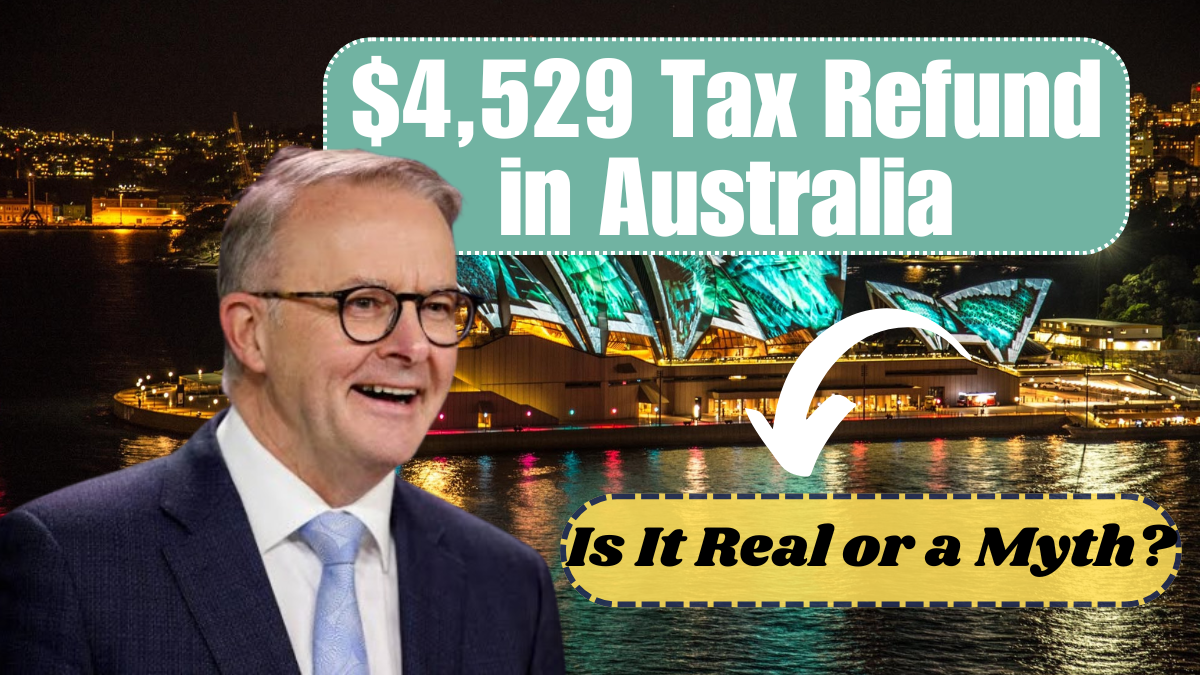A widely circulated claim about Australians receiving a $4,529 tax refund in 2025 has generated confusion. The number is indeed accurate — but it’s not a lump sum refund for everyone. Instead, it’s the maximum tax saving under Australia’s Stage 3 tax cuts, introduced from 1 July 2024. While high-income earners will enjoy the full benefit, most taxpayers will still see meaningful savings.
These changes are designed to increase take-home pay throughout the year by reducing the amount of tax withheld, not by issuing a one-time government payment.

What Is the $4,529 Tax Cut Really About
The $4,529 amount represents the maximum annual tax saving under the new Stage 3 tax cut reforms. Here’s what’s changing in the tax brackets:
-
The 19% rate drops to 16%
-
The 32.5% rate drops to 30%
-
The 37% threshold increases from $120,000 to $135,000
-
The 45% threshold increases from $180,000 to $190,000
These reforms simplify tax brackets and reduce tax for most Australians. However, only those earning $190,000 or more will see the full $4,529 in tax savings.
Tax Savings Breakdown by Income Level
Here’s how different income levels benefit from the Stage 3 tax cuts in 2025:
| Annual Income | Approx. Tax Savings (AUD) |
|---|---|
| $50,000 | $929 |
| $73,000 | $1,504 |
| $100,000 | $2,179 |
| $150,000 | $3,729 |
| $190,000+ | $4,529 (maximum) |
The tax savings are progressive — everyone gains something, but high-income earners benefit the most due to the bracket adjustments.
Who Qualifies for the 2025 Tax Cuts
To benefit from these savings, taxpayers must meet the following basic conditions:
-
Be an Australian resident for tax purposes
-
Have a taxable income of at least $18,201
-
Be employed or self-employed
-
Submit a valid tax return for the 2024–25 financial year
There is no separate application for the tax cut — it is automatically applied through your employer’s payroll system or via your tax return at the end of the financial year.
How the $4,529 Tax Cut Is Applied
This isn’t a direct refund paid into your account. Here’s how the savings are applied:
-
Your employer withholds less tax from your salary each pay cycle
-
You receive higher take-home pay
-
When you lodge your tax return, any overpaid tax is refunded
If your employer doesn’t adjust the withholding correctly, you might see a refund during tax season. Otherwise, the savings are spread throughout the year.
Example: Tax Savings in Action
Let’s take an example of Alex, who earns $90,000 annually.
-
Under the old system, Alex paid around $20,917 in income tax
-
Under the new system, Alex pays only $18,738
-
This results in an annual saving of $2,179
Alex’s paychecks will now have less tax withheld, resulting in higher net pay rather than a one-time refund.
Common Misunderstandings About the $4,529 Refund
Here are a few popular myths and the actual facts:
-
“Everyone gets $4,529” – False. Only those earning $190,000+ receive this full saving
-
“It’s a lump sum payment” – False. It’s a tax cut spread across the year
-
“Lower earners don’t benefit” – False. They do benefit, just not the full amount
These reforms are designed to bring consistent, long-term tax relief rather than short-term payouts.
Maximizing Your Tax Benefits in 2025
Here are tips to make the most out of the 2025 tax changes:
-
Review your PAYG Withholding – Make sure your employer is using the new rates
-
Keep track of eligible deductions – Include work-related expenses, donations, and study costs
-
Use a registered tax agent – They can ensure you’re claiming everything correctly
-
Consider super contributions – Voluntary super can reduce your taxable income
-
Stay updated with ATO changes – Rules may evolve based on budget announcements
FAQs
Is the $4,529 tax refund real for all Australians?
No, it represents the maximum tax cut available to individuals earning $190,000 or more. Others will receive smaller savings based on their income.
Will I receive $4,529 as a lump sum?
No, this is not a one-time payment. It’s a reduction in the tax you pay throughout the financial year.
When do the Stage 3 tax cuts start?
The changes began on 1 July 2024 and apply to the 2024–25 financial year.
Will low-income earners see any benefit?
Yes, even those earning around $50,000 will save around $900 annually under the new tax structure.
Do I need to apply for the tax cut?
No, it’s automatically applied through your payroll and reflected in your annual tax return.
Can I still get a tax refund in 2025?
Yes, if your employer over-deducts tax, you may still get a refund after filing your return.
What replaces the Low and Middle Income Tax Offset (LMITO)?
The Stage 3 tax cuts effectively replace LMITO, providing long-term savings rather than one-time offsets.
Is it worth hiring a tax agent in 2025?
Yes, a registered tax agent can help you claim all eligible deductions and ensure your return is optimized.
Click here to know more.
Aanchal is a passionate writer with a keen interest in storytelling, content creation, and creative expression. She enjoys exploring diverse topics and crafting engaging narratives that captivate readers.

